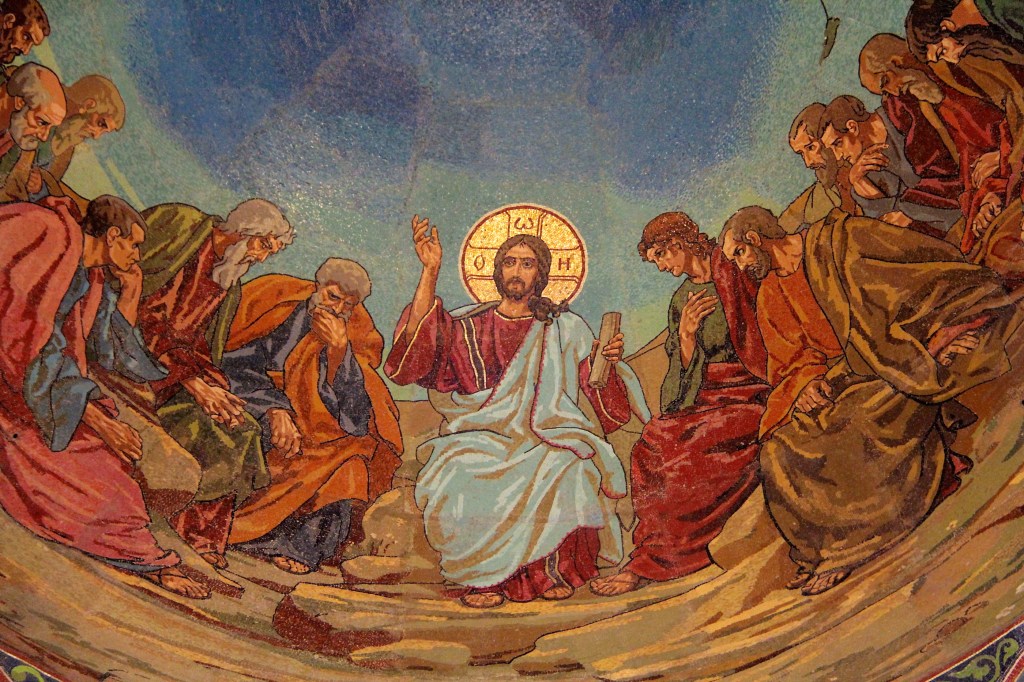“Hungry and Thirsty Blessings”

Matthew 5:1-7 (5:6) – July 31, 2022
Have you ever been really hungry? I mean, have you ever gone without food for more than a day? Longer than that? Hunger can be an ache inside, an actual pain inside your abdomen. Being physically hungry and thirsty can be dangerous for people’s health. Yet, food is not all that people hunger for.
Our Lord Jesus wanted to specifically mention those who were hungry and thirsty. “Blessed are those who hunger and thirst for righteousness, for they will be filled.” Yes, we can think of people who are actually, physically hungry and thirsty. That is a real need, and it’s a need for individuals and families all over the world.
Let us take a step back, and consider actual, physical hunger. What is that like? I have had the blessing of steady employment at a decent rate of income for several decades now. I do not recently have the first-hand experience of going to bed hungry, with nothing to eat in my kitchen. Not a can of vegetables in the cupboard, not a package of food in the pantry.
My friend Rev. Dr. Marilyn Pagán-Banks is the director of A Just Harvest, located right next to the Howard Street El station, in that congested and now gentrifying area on the far north side of Chicago. A Just Harvest is a nonprofit organization. Their summary statement is “Breaking bread, restoring community – every day. One meal at a time. One job at a time. One change towards wellness, peace, and justice at a time.”
After the Covid shut-down in March 2020, St. Luke’s Church was still receiving baked goods on Saturdays from Meier’s Bakery. Except, the men’s residence at the McGaw YMCA in Evanston – where I donated the baked goods – shut down, too. That meant NO more deliveries or donations, for many months. I had to quickly pivot, and so I gave a quick call to my friend’s organization, A Just Harvest. Part of their outreach is a food pantry; an industrial-service kitchen that provides a complete hot meal for free, between noon and 2 pm, 365 days a year. That is every day, even on bank holidays and major holidays, when other service centers are closed.
The Community Kitchen was overjoyed to hear about all the baked goods! So, for each weekend for over a year, I would take the baked goods from Meier’s on Waukegan to the Community Kitchen after church on Sundays. Until, Meier’s sadly closed for good in April 2021.
It is a marvelous thing to share our resources with others who do not have enough. That is part of what our Lord Jesus was getting at!
Yet, Jesus also mentioned “hunger and thirst for righteousness.” That adds a whole deeper layer to being hungry and thirsty. (as if regular “hunger and thirst” were not significant enough!) Yes, many people who followed Jesus were very hungry. They needed a secure food source. But, many people in Jesus’ day were also hungry for justice.
“One understanding of “righteousness” is justice. God’s justice means we make sure everyone has what they need. When we partner with God to bring justice to the earth, we are working toward a world where living things live in right and healthy relationships.” [1]
I know that sometimes, people get really caught up in their own lives, their family challenges, their health problems, and yes, financial difficulties. It’s really hard to focus on other people and their deep needs when you or I have some very deep needs of our own.
The same was very true in Jesus’s day, as well as all the times in between the first century and the 21st. We have talked about this before, how a huge crowd gathered around the Rabbi Jesus, and He saw their hurts and pains and cared for them in all kinds of ways. Yes, Jesus physically healed many! And yes, Jesus also saw each and every individual as worthwhile, as blessed, and as created by God. That is a big reason why He preached about God’s kingdom, where there is abundance for all. More than enough honor, food, money, love, power and resources for everyone to thrive.
“A lot of things were not right for the people listening to Jesus. In that time, some people had a lot of money and power. They used what they had to dominate other people. Some people were poor and felt powerless. Jesus speaks here to the people who feel that ache for a better world—God’s kind of world. Jesus knows their hearts are hungering more and more for relationships and systems to be fair and right. Just like we need food to live, we need love, hope, and healthy connections with others. Jesus understands and cares about all these needs.” [2]
Bringing in God’s kingdom is not just a task for our Lord Jesus. No! He has given that task to each of us, to each of His followers. That is what the Beatitudes are all about. It’s a commission, a charge for all of us, to go out into our own communities and put these tasks to work. Each idea from our Lord Jesus, each and every day.
We can even call the Beatitudes directives from God. Yes, each Beatitude holds a personal blessing, and each Beatitude holds a direct charge or task for each of us to complete. When we look at this list of blessings from God in this way, it can be incredibly daunting! Yet, with God’s help, all things are possible.
We all have the opportunity to fight for justice in many different ways. Are there particular issues that you and your family engage in? Do you hunger for environmental righteousness? Racial and gender equality righteousness? Food security righteousness? Senior care righteousness? Employment righteousness?
If every person in this world knew what it was to truly “hunger and thirst for righteousness,” there would be no danger of fighting or war, no need to fear bombs or muggings or name-calling or any other destructive behavior. Herein lies the way to true peace and justice on a horizontal plane, with our fellow humans, and true fellowship with God, on a vertical plane.
I ask again: what would Jesus do? How would Jesus bring about justice in a tangible way? Go. Do that. And, be blessed, for yours is indeed the kingdom of heaven.
(Suggestion: visit me at my other blogs: matterofprayer: A Year of Everyday Prayers. #PursuePEACE – and A Year of Being Kind . Thanks!
(Thanks to illustratedministries.com for their excellent Summer 2022 family Sunday school curriculum on the Beatitudes. I will be using this curriculum all summer as source material for a summer sermon series on the Topsy-Turvy Teachings of Jesus!)
[1] Illustrated Ministries, Curriculum for Summer Sunday school family series, “The Beatitudes.” Summer 2022.
[2] Ibid.



